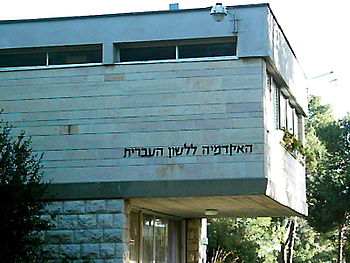Academy of the Hebrew Language
| האקדמיה ללשון העברית | |
 | |
| Formation | 1890 - Hebrew Language Committee 1953 - Academy of the Hebrew Language |
|---|---|
| Founder | Eliezer Ben Yehuda |
| Type | GO |
| Legal status | Language regulator |
| Purpose | To regulate the Hebrew language |
| Headquarters | |
| Coordinates | 31°46′20.34″N 35°11′54.71″E / 31.7723167°N 35.1985306°E |
Region served | Hebrew-speaking population |
Official language | Modern Hebrew |
President | Moshe Bar-Asher |
| Staff | 38 |
| Website | hebrew-academy |
Formerly called | Hebrew Language Committee |
The Academy of the Hebrew Language (Template:Lang-he-n, HaAkademya laLashon ha'Ivrit) was established by the Israeli government in 1953 as the "supreme institution for scholarship on the Hebrew language in the Hebrew University of Jerusalem of Givat Ram campus."[1]
History

The Academy replaced the Hebrew Language Committee (Vaʻad ha-lashon ha-ʻIvrit) established in 1890 by Eliezer Ben Yehuda, who was its first president. As Hebrew became the spoken language in Palestine and was adopted by the educational system, the Hebrew Language Committee published bulletins and dictionaries. It coined thousands of words that are in everyday use today.[2]
Its successor, the Academy of the Hebrew Language, has continued this mission of creating new Hebrew words to keep up modern usage.
Although the academy's business is creating new words from Hebrew roots and structures to replace loanwords derived from other languages, its own name is a loanword, "akademya."[3] It addresses this irony on its English website. [4] The Academy sets standards for modern Hebrew grammar, orthography, transliteration, and punctuation based on the historical development of the language.
Organization
The plenum consists of 23 members. In addition, the academy employs 15 academic advisors, among them respected scholars of language, linguistics, Judaic studies, and Bible. The Academy’s decisions are binding on all governmental agencies, including the Israel Broadcasting Authority.[3]
See also
- Hebrew University of Jerusalem
- Study of the Hebrew language
- List of language regulators
- Revival of the Hebrew language
- Moshe Bar-Asher
- Historical Dictionary Project of the Hebrew Language
- Autoridad Nasionala del Ladino, a language regulator for Ladino
- YIVO (Yidisher Visnshaftlekher Institut), a language regulator for Yiddish
References
External links
- Academy of the Hebrew Language - Official Website
